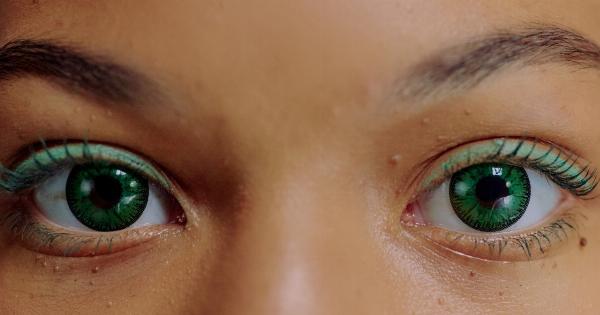Allergy season can be a tough time for contact lens wearers, as it often exacerbates symptoms such as watery eyes. The combination of itchy, red eyes and the discomfort of wearing lenses can make it challenging to find relief.
Luckily, there are several strategies and tips that can help contact lens wearers cope with watery eyes during allergy season. In this article, we will explore the causes of watery eyes during allergy season and provide practical advice on how to manage this issue effectively.
Understanding Watery Eyes during Allergy Season
Before discussing coping strategies, it is essential to understand why contact lens wearers often experience watery eyes during allergy season.
Allergens, such as pollen, mold spores, and pet dander, trigger an allergic reaction when they come in contact with the eyes. This reaction prompts the release of histamine, a chemical that causes various allergy symptoms, including excessive tear production.
When contact lens wearers are exposed to allergens, their eyes react similarly to those of non-lens wearers. However, the presence of contact lenses can exacerbate the condition.
Contact lenses can act as a foreign body and can trap allergens, making symptoms worse. Additionally, the lenses themselves can cause irritation, leading to increased tearing.
Coping Strategies for Watery Eyes
Managing watery eyes during allergy season involves a combination of preventive measures and symptom relief strategies. Here are ten practical tips to help contact lens wearers cope:.
1. Visit an Eye Care Professional
Before allergy season hits, it is advisable to visit an eye care professional for a comprehensive eye exam. They can assess the condition of your eyes and determine if there are any underlying issues that need to be addressed.
They can also recommend appropriate contact lens solutions or recommend switching to daily disposable lenses, which can be more comfortable for individuals with allergies.
2. Opt for Daily Disposable Lenses
Daily disposable lenses are an excellent option for individuals with watery eyes during allergy season. These lenses are worn once and then discarded, eliminating the need for cleaning solutions that may contain allergens.
Daily disposables reduce the risk of allergen build-up and can provide greater comfort for contact lens wearers with allergies.
3. Implement Proper Hygiene
Practicing good hygiene is important for preventing the accumulation of allergens on contact lenses. Before handling your lenses, make sure to wash your hands thoroughly with mild soap and water.
It is also crucial to clean and disinfect lenses properly according to the recommended guidelines provided by your eye care professional.
4. Use Preservative-Free Lubricating Eye Drops
Preservative-free lubricating eye drops can help alleviate dryness and irritation caused by watery eyes during allergy season. These drops provide relief from redness and itching and can be used while wearing contact lenses.
However, it is essential to choose drops specifically formulated for use with contact lenses and seek advice from an eye care professional.
5. Avoid Rubbing Your Eyes
Although it may be tempting to rub your itchy eyes, doing so can worsen symptoms and cause further irritation. Rubbing creates friction, thereby releasing more histamine and exacerbating watery eyes.
Instead of rubbing, try using a clean, cold compress to soothe itchiness and reduce swelling.
6. Consider Allergy Medication
For individuals with severe allergy symptoms, over-the-counter or prescription allergy medication may be necessary.
Antihistamines and other allergy medications can help reduce the body’s histamine response, alleviating watery eyes and other allergy symptoms. However, it is important to consult with a healthcare professional or eye care specialist before starting any medication.
7. Keep Windows Closed
During allergy season, it is wise to keep windows closed to prevent pollen and other allergens from entering your living space. Utilizing air conditioning with air filters can help minimize the amount of allergens indoors.
By reducing your exposure to allergens, you can lessen the severity of watery eyes and other allergy symptoms.
8. Rinse Your Eyes with Saline Solution
Rinsing your eyes with preservative-free saline solution can provide temporary relief from watery eyes caused by allergens. It helps remove any trapped allergens from the surface of the eye, reducing irritation and tearing.
However, it is crucial to follow the manufacturer’s instructions and use solutions specifically designed for eye rinsing.
9. Stay Hydrated
Drinking plenty of water throughout the day can help keep your eyes hydrated and may alleviate some symptoms of watery eyes. Proper hydration can reduce dryness and soothe irritation, making contact lens wear more comfortable during allergy season.
Remember to also limit or avoid excessive caffeine and alcohol consumption, as they can contribute to dehydration.
10. Take Breaks from Wearing Contact Lenses
If your symptoms persist or become too uncomfortable, it might be necessary to take breaks from wearing contact lenses during allergy season. Instead, wear eyeglasses for a few days to allow your eyes to recover.
This can help minimize further irritation and discomfort caused by lens wear.
Conclusion
Watery eyes during allergy season can be a bothersome issue for contact lens wearers.
However, by implementing these coping strategies and working closely with an eye care professional, individuals can find relief and continue wearing contact lenses comfortably. Remember, everyone’s eyes are unique, so finding the right combination of strategies may require some trial and error.
Prioritize your eye health and comfort by seeking professional guidance when needed, and enjoy allergy season without the constant discomfort of watery eyes.






























